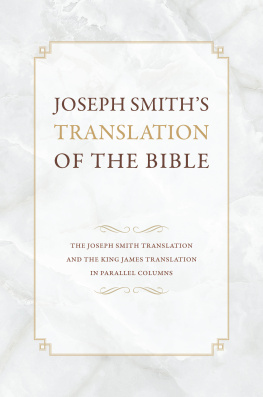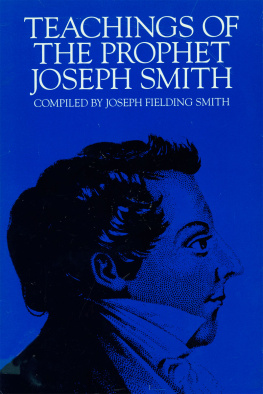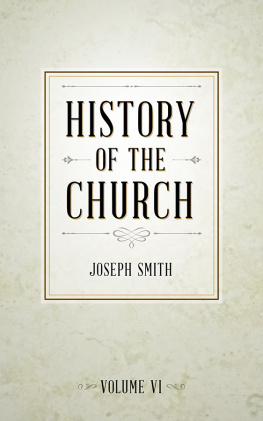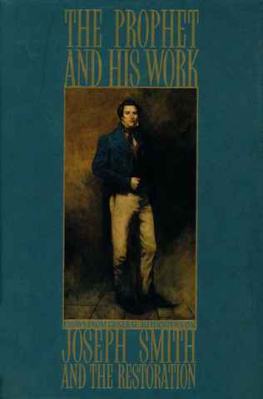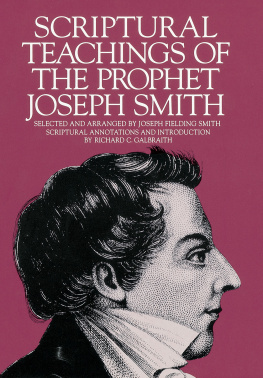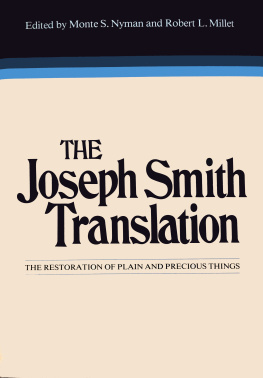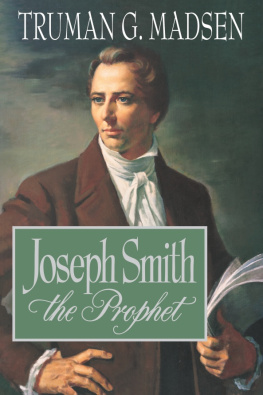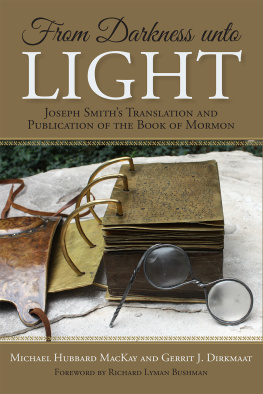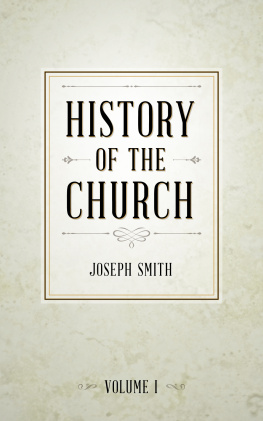Published by the Religious Studies Center and BYU Press, Brigham Young University, Provo, Utah, in cooperation with Deseret Book Company, Salt Lake City, Utah.
Visit us at rsc.byu.edu.
2021 by Brigham Young University. All rights reserved.
Printed in the United States of America by Sheridan Books, Inc.
DESERET BOOK is a registered trademark of Deseret Book Company.
Visit us at DeseretBook.com.
Any uses of this material beyond those allowed by the exemptions in US copyright law, such as section 107, Fair Use, and section 108, Library Copying, require the written permission of the publisher, Religious Studies Center, 185 HGB, Brigham Young University, Provo, UT 84602. The views expressed herein are the responsibility of the authors and do not necessarily represent the position of Brigham Young University or the Religious Studies Center.
Edited by Kent P. Jackson.
Cover and interior design by Emily V. Rogers.
ISBN: 978-1-9503-0421-9 | eISBN 978-1-64933-114-4
Library of Congress Cataloging-in-Publication Data
Title: Joseph Smiths translation of the Bible : the Joseph Smith
translation and the King James translation in parallel columns.
Other titles: Bible. Selections. English. Smith. 2021.
Description: Provo, Utah : Religious Studies Center, Brigham Young University : Salt Lake City : Deseret Book, [2021] | Summary: The complete text of the Bible revision made by Joseph Smith, the Latter-day Saint prophet and founder of the Church of Jesus Christ of Latter-day Saints, presented with modern punctuation and spelling and with the original chapter and verse divisions created by Joseph Smith and his scribes. In his lifetime, he and his contemporaries referred to this work as the New Translation. Since the late 1970s it has most often been called the Joseph Smith Translation. Published in parallel columns with the corresponding verses of the King James Bible-- Provided by publisher.
Identifiers: LCCN 2021037718 | ISBN 9781950304219 (hardcover) | eISBN (eBook)
Classification: LCC BX8630 .A2 2021 | DDC 220.5/209--dc23
LC record available at https://lccn.loc.gov/2021037718
Contents
joseph smiths translation of the bible
T his book contains the text of the Bible revision made by Joseph Smith, the Latter-day Saint prophet and founder of the Church of Jesus Christ of Latter-day Saints. It is based on many years of careful research in the Prophets original manuscripts and presents the text as he prepared it, but with modernized punctuation and spelling. This is the first printing of the revised Bible in finished form and scripture format with the original chapter and verse divisions created by the Prophet and his scribes. In Joseph Smiths lifetime, he and his contemporaries referred to this work as the New Translation. Since the late 1970s it has most often been called the Joseph Smith Translation.
Joseph Smith viewed revising the Bible to be a branch of his prophetic calling. These statements illustrate the respect that those who worked with Joseph Smith on the Bible revision had for it.
The Prophet labored on the Bible project from June 1830 until July 1833. The manuscripts show evidence of an initial dictation of the text followed by refinements he made to it and also the insertion of punctuation, capitalization, and chapter and verse divisions. He called his work with the Bible correcting
The New Translation makes significant contributions to Latter-day Saint beliefs, particularly in the early chapters of Genesis. Key topics in which the Old and New Testament revisions are the source of significant Latter-day Saint beliefs include the nature of God, the universal impact of Gods work, the plan of salvation, the character and motives of Satan, the Fall of Adam and Eve, the antiquity of Christianity, the creation of an ideal community called Zion, the purpose of the law of Moses, and the Second Coming of Jesus Christ. In addition, revisions throughout the Bible alter the wording of existing verses in many ways that make the text more clear and understandable.
The Latter-day Saint scriptural book called the Pearl of Great Price contains two excerpts from the New Translation. Selections from the Book of Moses is the revision of Genesis 1:16:13, preceded by an account of some visions of the biblical prophet Moses. Joseph SmithMatthew is the revision of Matthew 23:3924:51. These are the only parts of the revision that have been canonized, but many additional passages have been placed in Bible footnotes or in a collection of selected verses in Latter-day Saint scriptures in English and other languages.
.For the title New Translation, see Books!!!, Times and Seasons 1 (July 1840): 140; History of Joseph Smith (Continued), Times and Seasons 5 (January 1, 1845): 754; 6 (February 15, 1845): 801; History, 18381856, volume C-1 [2 November 183831 July 1842], pp. 1083, 1093, 1155, 1275, josephsmithpapers.org; and Doctrine and Covenants 124:89.
.See Joseph Smith, History of Joseph Smith (Continued), Times and Seasons 5 (May 1, 1844): 513.
.Doctrine and Covenants 35:20.
.Old Testament Manuscript 1, p. 1, in Scott H. Faulring, Kent P. Jackson, and Robert J. Matthews, eds. Joseph Smiths New Translation of the Bible: Original Manuscripts (Provo, UT: Religious Studies Center, Brigham Young University, 2004), 83.
.Old Testament Manuscript 1, p. 3, in Faulring, Jackson, and Matthews, Joseph Smiths New Translation of the Bible: Original Manuscripts , 86.
.New Testament Manuscript 1, p. 1, in Faulring, Jackson, and Matthews, Joseph Smiths New Translation of the Bible: Original Manuscripts , 159.
.God may correct the scripture by me if he choose. Discourse, 13 April 1843, as Reported by Willard Richards, p. [125], josephsmithpapers.org.
.Minute Book 2, p. 13 (October 25, 1831); josephsmithpapers.org.
.See Noah Webster, An American Dictionary of the English Language (New York: S. Converse, 1828), s.v. translate and translation. Conveying words from one language to another is, of course, also listed among the definitions.
.The following books received no changes: Ruth, Ezra, Esther, Ecclesiastes, Song of Solomon, Lamentations, Obadiah, Micah, Nahum, Habakkuk, Zephaniah, Haggai, Malachi, 2 John, and 3 John. Most of those were noted with phrases like this: MicahCorrect. Ecclesiastes is the only book not mentioned at all, and at the Song of Solomon, Joseph Smiths scribe wrote the following: The Songs of Solomon are not Inspired writings.
.The Prophet made changes in almost 1,100 verses in the Old Testament and in over 2,500 verses in the New Testament.
from manuscript to finished text
T his volume contains all the biblical text that was written on the manuscripts of Joseph Smiths New Translation of the Bible (the Joseph Smith Translation, or JST), including those verses that were written on the manuscripts but in which he made no changes. The New Translation text is presented opposite the corresponding verses of the King James Version. The sign in the King James Version column identifies those verses that the Prophet dictated without change. The transcription in this book presents Joseph Smiths final text but with capitalization, punctuation, and spelling standardized and with a few other small, necessary adjustments (see below). In places where he dictated only isolated words and the locations for their insertion into existing verses, the complete verses have been reconstructed with the words of the King James translation. Old Testament passages quoted (often partially paraphrased) by New Testament authors are cited in footnotes.

